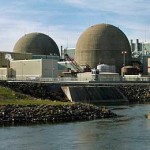Dominion Virginia Power, as is its style, has achieved a quiet but far-reaching regulatory victory. The General Assembly has passed a complicated bill that would help Dominion write off costs for a new nuclear reactor while avoiding giving potential refunds or rate cuts to customers.
The bill, which easily sailed through the legislature, has drawn attention to whether the utility really will build a third nuclear unit at North Anna and why bills to help smaller players trying to create renewable sources of energy seem to get nowhere in Virginia.
Dominion will be allowed to deduct $400 million from its profits in a scheme that allows it to count as costs the nuclear research it does. This will likely help it avoid paying rebates to consumers the next time the State Corporation Commission considers its rates.
There are several curiosities with the scheme. For one, although Dominion filed early plans for a third reactor about a decade ago, the project hasn’t seemed to move very far. The disaster at the Fukushima plant in Japan in 2011 forced a rethink of how the U.S. plans its new reactors. Another problem is that North Anna suffered a major setback later in 2011 when an earthquake forced a shutdown at that station and pushed reactors past their design limits.
The danger is hardly news but may be largely forgotten. In the 1970s, Virginia Electric & Power Co., Dominion’s predecessor, was fined by federal regulators for knowing and lying about some aspects of a geological fault line that runs under the North Anna area when it planned the nuclear power station in the 1960s.
I have visited North Anna in recent years and have asked Dominion about how they plan to pay for a third reactor. Some estimate it may cost about $10 billion. Many reactors on the drawing boards can’t be built without federal loan guarantees. Dominion has said it won’t need such guarantees.
Last month, the Department of Energy announced that the federal government will provide $6.5 billion in federal loan guarantees for two new reactors planned by the Southern Company in Vogtle, Ga. They are the first in such government backing.
A big question is how far along is the third unit at North Anna and why the General Assembly felt comfortable about making such beneficial moves if there’s any question about it.
Meanwhile, Bill Sizemore at The Virginian-Pilot has an intriguing story about how Dominion, which gave $1 million to Virginia politicians last year, has little trouble with its laws while smaller fry in the renewable energy sector struggle.
They have failed at getting the General Assembly to push tax credits to help install solar, wind and other, non-fossil and non-nuclear forms of power. Originally, the proposal called for $100 million in tax credits a year but that was pared down to $10 million and then was put off for consideration next year.
Virginia has voluntary Renewable Portfolio Standards calling for a percentage of new power generation to come from renewable sources. The approach favors large utilities such as Dominion and Appalachian Power. Neighboring states North Carolina and Maryland have mandatory standards and that may be one reason why Virginia has only 5 percent of North Carolina’s solar power capacity.
Dominion points out that it has renewable projects such as solar powered panels at a university and has plans for offshore wind, but these efforts are relatively modest.
One irony with the current situation involving renewables is that conservatives argue that their promoters must meet strict free market tests. If solar and wind and other sources can expand, they need to make it without government help based on their ability to innovate and market salable products. But the traditional, large utilities have no trouble getting billions in government help in federal loan guarantees or in rate write offs that Dominion will enjoy.
So, it seems the fix is in for traditional power in Virginia. That was certainly the case with former Gov. Robert F. McDonnell who wanted to make Virginia “the energy capital of the East Coast.” He strongly backed offshore drilling. Incoming Gov. Terry McAuliffe had been suspicious of offshore drilling in 2009 when he first ran for governor but has since changed his position to the consternation of environmentalists.
“We’re really disappointed but not surprised,” says Glen Besa, head of the Sierra Club’s Virginia chapter.



